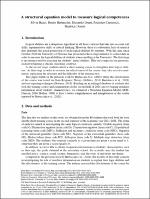Chapter A structural equation model to measure logical competences
Author(s)
BACCI, Silvia
Bertaccini, Bruno
Bruni, Riccardo
Crescenzi, Federico
Donati, Beatrice
Language
EnglishAbstract
Logical abilities are a ubiquitous ingredient in all those contexts that take into account soft skills, argumentative skills or critical thinking. However, the relationship between logical models and the enhancement of these abilities is rarely explicitly considered. Two aspects of the issue are particularly critical in our opinion, namely: (i) the lack of statistically relevant data concerning these competences; (ii) the absence of reliable indices that might be used to detect and measure the possession of abilities underlying the aforementioned skills. This paper addresses both aspects of this topic by presenting the results of a research that we conducted between October and December 2020 on students enrolled in various degree courses at the University of Florence. The dataset has been collected by a three-stage initiative. We started from an entrance examination to assess the students' initial abilities. This test included ten questions, each regarding a specific aspect of logical reasoning. Then, students underwent a short training course to strengthen their knowledge of logic. At the end of the short course, students underwent a final examination to evaluate the effectiveness of the training. To verify the effectiveness of the training program we used students’ characteristics into a Structural Equation Model comparing the distribution of abilities before and after the training.


 Download
Download Web Shop
Web Shop